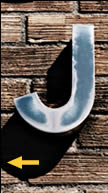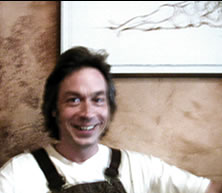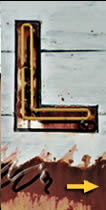 |
 |
 |
||||||||||
A Conversation with Jim Lauderdale (continued)
JL: The last two years of high school, I went back to North Carolina to a Quaker Free School, with no grades, very laid back. I started doing some plays in school, and one of my favorite classes was a mime class. We didn't do white face mime, but did various improvisational things. When it was time to go to college, I was directionless in a lot of ways, and really just wanted to play music. My folks really wanted me to go to college, and they would foot the bill. That was the tradition. I didn't know where to go, and I auditioned for the North Carolina School of the Arts.
On the way to the audition, I had a car wreck, and barely made it. The car just limped in. I had to pull the fender away from the tire, and it was wobbling really bad, not to mention I was really shaken up. Later I read one of the comments from the auditioning teachers that said, "He was very wooden in his audition, but maybe it was because he'd been in a car wreck." I think maybe I got in because of the pity factor, but I got in.
It was very challenging, and I almost took leaves of absence or dropped out. I had some offers to join Country or Bluegrass bands, but I stuck it out, and did gigs on the side. Then when I got out of school, I went up to NYC, and started doing some gigs. I had day jobs, started doing Country gigs.
A guy named John Messler, whom I'd met in Nashville, was a big Gram Parsons fan, and we had that in common. Also Clarence and Roland White. So he got me set up with a solo gig at a place called O'Lonnie's, I played between the band sets. Larry Campbell was part of the scene [who plays with Dylan now], as was Buddy Miller, and Julie, though she went to Texas and was replaced by Shawn Colvin. So there was a very cool scene going on, and lots of good pickers. I was in an outfit called the Floyd Domino Band, he was the piano player for Asleep at the Wheel, and Tony Garnier was the bass player. Tony turned me on to a lot of Country stuff that I hadn't heard yet, like Johnny Bush and some Ray Price material I hadn't run across. And Tony was a big George fan.
So I auditioned and got in this show called Cotton Patch Gospel. I played banjo and guitar. I actually turned that down, Harry Chapin really wanted me to do it, he'd written the music. I turned it down because I was in this house band in New Jersey, and we'd just gotten the gig at this big Country place.
PM: Where in Jersey?
JL: In Fort Lee, a place called The Crystal Palace. The opening weekend was Ricky Skaggs, and Vassar Clements came soon after. After I turned it down, something told me I'd made a mistake. So I went to Boston, where it got mixed reviews, they were working the kinks out of it. Then it closed up there, and they wanted to bring it to NYC. Then Harry died, from a heart attack. Then they ended up bringing it Off Broadway, but he never got to see it.
PM: What year is this?
JL: That was 1981, I guess. It was a great time to be in NYC, because that show was running, and then I could go do gigs right after the show. Buddy Miller would always let me sit in with his band, at a place called the City Limits, and that provided a moral reinforcement and a boost, more than he probably realizes, and it kept my spirits up. Cotton Patch Gospel closed, and then a lot of these Country venues I was playing in the New York area closed.
They offered me a role in Cotton Patch Gospel in Woodstock, NY, and I took that, and it went to Dallas and Atlanta. From there I got into a play called Pump Boys and Dinettes, where the musicians were also actors. Chicago was the home for that show, and I'd fly to New York on my days off to do demos with guys I knew in the city, because I was really trying to get a record deal. Meanwhile, in Chicago, I really enjoyed going out to the Blues clubs. I'd hear Sunnyland Slim, a lot of piano players, and Johnny Littlejohn, a slide player, and Otis Rush, they were the main guys I'd go see.
I was kind of getting frustrated, though, because I felt like I hadn't stuck to my guns. I saw an article about Dwight Yoakam, who'd made an independent record, and was gonna get signed to Warner Brothers. I felt that if I had just stayed, somewhere, and done my thing, I could be doing that. Instead, I was singing somebody else's stuff. So I got kind of down on myself, even though it was a great day job and gave me a lot of time to write.
Soon they were auditioning for this show Diamonds Studs. When I was in high school in North Carolina, I'd just wanted to be in that show as the banjo player, it's about Jesse James. I auditioned for it, and got the part of Jesse James. And Shawn Colvin got the part as my wife. I'd known her in New York, and the Red Clay Ramblers were part of the band. It was a great show, and we went to Cleveland with it, and it was supposed to have a long extended tour and go to Broadway or L.A. and I kind of figured that that was my ticket into a record deal. Unfortunately, for one reason or another, that show abruptly closed in Cleveland, and I was real disappointed.
Then I ended up going to L.A. with the offer of doing Pump Boys out there, replacing one of the Pump Boys writers, Jim Wan. And I really had this thing about not going to L.A., why would I want to go there, I don't want to go there. I only wanted to stay for a couple of months, and I wanted to get a band together with John Leventhal [now married to Roseanne Cash], who I'd done a lot of demos with, and this drummer, Mike Holloman, and a bassist named Gary Bristol, having that as the core group.
PM: Where did you want to do that?
JL: I wanted to go to New York, or Austin, or North Carolina, somewhere. I was afraid to come to Nashville. Anyway, I got out to L.A. and went out one night to see Rosie Flores. Billy Bremner was playing with her, and Steve Fishell [on steel], and Don Heffington [on drums].
PM: Wow.
JL: Right, wow, this lady's really got it going on, I thought. There's actually a scene here. So I started getting a few gigs together, and it all started to fall into place. Anyway, so all that is my background with shows like that. Then I got a call last February from Carolyn Copeland Rossi, who'd been one of the producers for Cotton Patch Gospel, years ago in New York. She asked me about the show [The Tammy Wynette Story], and the thought intrigued me, of playing George Jones. But I eventually turned it down. I had a record coming out in June, it was just bad timing for me. But then the show was going to be at the Flat Rock Playhouse for a few weeks, to get it up and running, before it came to the Ryman. [in Nashville]
PM: Where's the Flat Rock Playhouse?
JL: Flat Rock, NC, near Asheville. I'd worked there as a kid, in the summertime, cutting grass and working at the concession stand. That had also led me to the North Carolina School of the Arts. My folks were near there, too, so I thought maybe I should do it. Then I turned it down again, and got offered this tour with Lucinda, which would have eaten into most of the rehearsal process. They gave me a call back and said, "Look, you can miss those two and a half weeks of rehearsals..."
PM: All but the last few days.
JL: Right. By this time, all the signs are pointing toward doing the show. But one of the first things I told Carolyn in our earliest conversations was that I'd have to call George Jones and make sure that he approved of the show and approved the script, and approved of the idea of me playing him in the production. He's too important to me, and all those things had to be assured in advance. When I first heard George Jones, it was like hearing the Beatles or Otis Redding, or Robert Johnson for the first time, you know. It did something to me, created a real change. And Carolyn said, "Yes, he's all for the show and the script, and with you playing the part."
And then I got to have dinner with him. A few nights ago, a woman called named Martha Detweiler, who was a good friend of Tammy's, and Tammy's daughter Jackie. We were going to go out together for dinner. She called and said, "Listen, George and Nancy want to take us all out and bring some of their friends." So I got to sit next to him at dinner, and I was real shy, because the man is a real icon to me.
And he and his wife were so nice, and I just didn't say much. He was saying "Now come on, have some of this spaghetti, or it's just gonna go to waste," and he mentioned that he didn't think that he and his wife were going to be able to come to the show, and she said, "Well, when we come, we're not going to tell you."
This past Thursday, right before intermission, I found out that they were there, and they saw the whole show right up until the last song, and took off then to avoid the crowd. So it was kind of surreal to be on the Ryman stage portraying a legend that you know is watching you from the audience. But I've listened to him so much, and done his songs so much at gigs, that if there was any role I was born to play, it would be him. So it brought me out of my stage retirement, I don't know if I'll ever do another show like this. There's something in the tonality of my voice, even, that's more like him or Buck, but Buck's a lot taller, I'm even built more like George Jones.
PM: I've seen photos of you in character, and the look on your face is so George Jones, I laughed out loud.
JL: I've really studied him a lot.
PM: Apart from your many cuts with major artists, has mainstream Country radio caught on to you as an artist in any way?
JL: No. Just WSM, here in Nashville, and that's really neat. Their motto is "Too Country, and proud of it." The playlist over there is not strictly Top 40, and I'm honored to be played on that station and also to have played at the Opry.
PM: It's so Lauderdalian that you write with traditional country greats like Harlan Howard, Melba Montgomery and Frank Dycus. Those have to be some very interesting writing sessions, into which I'm sure our readers and myself would like some insight, if you'd be so kind. continue
print (PDF) listen to clips archives puremusic home